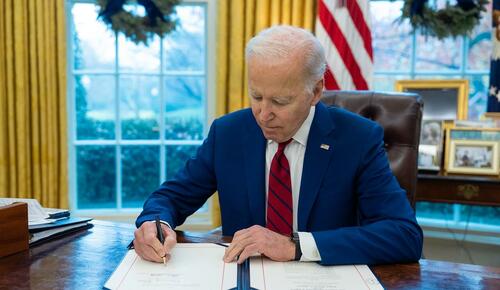
In a significant regulatory shift that took place quietly the day after Christmas, the Biden administration finalized new climate rules targeting natural gas-powered instantaneous water heaters. The Department of Energy (DOE), which traditionally issues a press release for such regulations, chose not to announce these changes publicly, raising eyebrows across various sectors. According to the Free Beacon , the new regulations aim to reduce carbon dioxide emissions, a move aligned with broader climate change mitigation efforts.
However, the regulations are set to remove approximately 40% of the current tankless water heater models from the market by 2029 (between gas and electric). This shift is expected to force consumers to opt for either more expensive or less efficient alternatives. An industry analysis forecasts that the average cost increase for new water heaters due to the regulations will be around $450.

This price hike is poised to disproportionately affect low-income and senior households, who are among the most reliant on the more affordable models currently targeted for phase-out. Meanwhile, the timing of these regulations is noteworthy - coming in the wake of President-elect Donald Trump's electoral victory over Vice President Kamala Harris. Trump has expressed intentions to roll back many of Biden's climate initiatives to bolster energy production and stimulate economic growth.
This regulatory push on water heaters is part of a series of actions targeting household appliances, including gas stoves and refrigerators, aimed at reducing carbon emissions and promoting electric alternatives. Ben Lieberman, a senior fellow at the Competitive Enterprise Institute, criticized the move, stating, " It bans an entire category of tankless water heaters and the ones that are most affordable. This is all part of the climate change agenda.
..an antipathy towards natural gas because they want to electrify everything.
" Industry's Response and Legal Challenges The regulation has sparked extensive debate about its legality and practicality. The American Gas Association has hinted at possible legal action, suggesting that the rule might violate the Energy Policy and Conservation Act, which prohibits banning products that offer unique performance characteristics. Frank Windsor, president of Rinnai America, the nation's leading manufacturer of tankless water heaters, voiced strong opposition.
He highlighted the contradiction in eliminating higher-efficiency product categories- telling the Beacon , " If you really want to impact the water heating ruling, you really need to deal with the tank models ." Rinnai America, having invested $70 million in a new facility in Georgia based on the previous administration's manufacturing incentives, finds itself at risk of seeing its investment become obsolete under the new rules..















